Creation: Mutations Refutations Part II
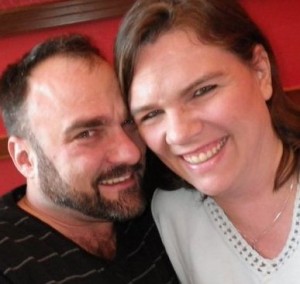
A Sunday guest post by my brilliant husband, Gregg.
Every Sunday, my clever husband offers me a “day of rest” by taking over the homemaker duties here. His primary topic, the Biblical Truth of Creation vs. Darwinism, is a subject that has broad reaching scientific, social, and metaphysical implications and is gaining momentum in our modern culture.
For believers and non-believers alike, the primary purpose is to present scientific, historical, logical, and/or sociological data in an empirical and defensible fashion, as much as possible written in layman’s terms, and in a format suitable for supplementing any homeschool curriculum whether you choose to believe the Biblical account — or secular guesses — about the origins of human life on earth.
The Evolution Elevator: Up or Down, please?
Darwinism claims that all life began, at the very first, as non-life (dirt and rocks and such) that one day decided to form itself into a “simple” single-celled organism. Darwinism provides no reasonable basis for the decision on the part of the non-living material, nor does it provide a reasonable explanation as to how this might have occurred once the decision was made. It merely religiously accepts this assumption based on faith because otherwise the remainder of the fable has no viable basis.
Regardless, this mythical “simple” self-replicating single celled organism that first sprang into existence billions of years ago then gradually grew smarter and faster and bigger and more complex over long ages of time, through chance, and purely random changes via only two mechanisms, according to the Neo-Darwinian Theory of Evolution which is the most commonly accepted explanatory device that sprang from the Modern Evolutionary Synthesis.
The two engines are that of 1) utterly undirected Mutations and the allegedly undirected but always reductive process of 2) Natural Selection. According to the philosophy of Darwinism, all of this occurs all by itself — randomly — in spite of mathematically impossible odds, and without any structures in the entire universe having been intelligently designed or created.
This rather grand claim further alleges that all the very particular, highly and specifically complex information, symbiotic relationships, interdependent systems, and complicated biological structures in all “higher” life forms “climbed” the “tree of life” by going “up the evolutionary ladder” from simple little uncomplicated single celled organism to human being. This is common in the parlance of our time. For instance, it has become part of the modern vernacular that someone deemed somehow more fit — smarter, faster, or stronger — is somehow “more evolved” than others.
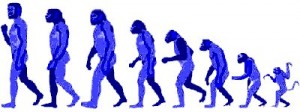 So we are quite literally talking about life RISING UP from molecules to man, from amoeba to Ambassador, from fish to Philosopher, in the complete absence of any kind of Creator. That is the philosophy of Darwinism. The philosophy appeals to Darwinists on three levels, that of ethos (character — usually that of agnostic or atheist), pathos (emotion — usually that of moral relativism and rationalization) which very often allows Darwinists to abandon or ignore logos (logic) in making embracing these claims.
So we are quite literally talking about life RISING UP from molecules to man, from amoeba to Ambassador, from fish to Philosopher, in the complete absence of any kind of Creator. That is the philosophy of Darwinism. The philosophy appeals to Darwinists on three levels, that of ethos (character — usually that of agnostic or atheist), pathos (emotion — usually that of moral relativism and rationalization) which very often allows Darwinists to abandon or ignore logos (logic) in making embracing these claims.
The logical claim is that less evolved “lower” life forms become more evolved “higher” life forms by means of the mechanisms of Neo-Darwinism — namely: mutation and natural selection.
In this post, I will not address the ethos or pathos of Darwinists who hold their philosophy sacrosanct. I will analyse only the logic because, in my humble opinion, the very fact that mutations are clearly “going the wrong way” as far as the Neo-Darwinian evolutionary model is concerned is a very serious argument against the entire philosophy.
Factually, since natural selection is always reductive, the only remaining means by which Neo-Darwinism can add information to any organism is by means of mutation. Hence, from a purely logical point of view, the mechanisms of mutation must be shown to be additive in nature. Mutation must be shown to be demonstrably and substantively able to infuse NEW and/or ADDITIONAL information into the genes of living things. Moreover, mutation must not be shown to substantively act as a reductive mechanism in living things.
(Clashing) World Views on Mutation

The Christian world view claims that all of God’s Creation was perfect at first and that corruption was introduced into that perfect creation by the Fall of Man. The belief is that by our sin which we purposefully introduced into God’s perfection as an act of our free will is responsible for the imperfections we now witness in all of creation.
With that as the given basis for our beliefs, it should be apparent that according to my world view, mutations help explain the origin of things such as parasites, disease, hereditary defects, and the loss of traits in all kinds of living things. According to my world view, time, chance, and purely random changes do just what any reasonably intelligent person would expect them to do. They remain consistent with the General Second Law of Thermodynamics. In other words, chance, randomness, and long ages of time break things down, make ordered things tend toward disorder, reduce stasis, and add entropy into any and every system.
We must grasp a key point to have a better understanding of the argument. Key is this: the types of mutations that Darwinists claim can infuse desirable traits into living things have never actually been observed to take place. These mutations are entirely hypothetical and the hypothesis for their existence is based on a rather massive assumption. The assumption is this: “Obviously these mutations must have taken place because there is no other materialistic explanation for the complexity and diversity we currently observe in living things.”
The truth is that mutations are detrimental veritably thousands of times more often than they are beneficial to any living thing. If early Darwinists had known what we now know about mutation, it seems highly unlikely that “mutation” would ever have even been contemplated as the primary engine, the principal means of evolutionary “upward” progress.
By producing defects or blocking the normal function of certain genes, mutations have introduced numerous genetic abnormalities into human populations. Tay-Sach’s Disease may have arisen in Czechoslovakia in the 1920’s as a mutation in the gene for producing an enzyme crucial to brain function. Hemophilia (bleeders’ disease) such as that which afflicted the royal houses of Europe may have arisen as a mutant of a clotting-factor gene in Queen Victoria.
Consider this: nearly every mutation we know about is identified by either the disease, debilitating condition, or grosser abnormality in which it results in living things. Using mutation to explain some of the disorder, entropy, and general breaking DOWN that we witness in existing genetic order is nearly the exact opposite of claiming that mutations can explain the build UP of genetic order. Plainly, in terms of simple logic, corruption introduced into perfection is the most direct inference to be drawn from the effects of the mutations that we actually observe in modern science. It is not logical to infer that mutation builds more and more perfection into corruption. That is, in fact, a good example of non sequitur.
Darwinists sometimes refer to mutations as the “engine of evolution” or the “crucible of creation.” This is pure euphemism. Mutations never generate. Mutations debase. In terms of both 1) simple logic and very often as is evidenced in 2) empirical, observational science, the ordered state must already exist (have been created) before mutations can introduce disorder into it.
Mutations are Real
Natural selection occurs. Darwinists who claim that Christians deny the very existence of selection are simply arguing with a straw man. Those who subscribe to a Christian world view argue that since natural selection (or directed/artificial selection for that matter; such as breeding champion dogs, Derby winning thoroughbred horses, or county fair blue ribbon roses) cannot account for Darwinian evolution. Natural selection can only account for hybridization and speciation within a specific kind. Selection is ALWAYS reductive and always confines itself within the genetic boundaries of created kinds. Dogs are always dogs, horses are always horses, and roses are always roses.
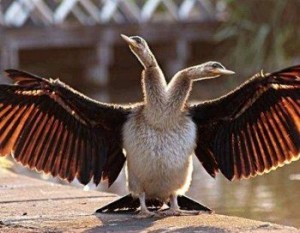 Just as with natural selection, those of us who subscribe to a Christian world view know that mutations are real. Mutations occur. Mutations take place. Mutations are real things.
Just as with natural selection, those of us who subscribe to a Christian world view know that mutations are real. Mutations occur. Mutations take place. Mutations are real things.
Just as with selection, whether or not mutations exist is likewise not the argument on the table. That is a straw man. The crux of the argument really is that mutations more directly evidence a corruption of the already created order by change over time than mutations evidence any kind of infusion of new or additional order into randomly created simplicity.
Human beings, as a race, are subject to more than 3500 mutational disorders (so far). Geneticists call this the “genetic burden” or “mutation load.” Obviously, we don’t exhibit as many defects as we may individually carry because human beings have two sets of genes that make up our chromosomes, one set of genes from our mother and another from our father. Thus, the “bad genes” we inherit from our mother are usually “corrected” by our father’s healthy genes, and vice versa.
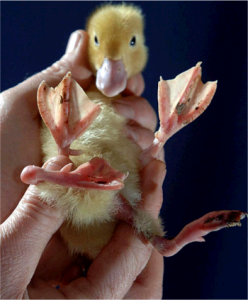 In their textbook on Neo-Darwinian evolutionary principles and theory, Dobzhansky et al. state clearly that the term “genetic burden” implies a burden that “weighs down” a species and “lowers” its genetic quality or, what other Darwinists would call the “fitness” of the organism.
In their textbook on Neo-Darwinian evolutionary principles and theory, Dobzhansky et al. state clearly that the term “genetic burden” implies a burden that “weighs down” a species and “lowers” its genetic quality or, what other Darwinists would call the “fitness” of the organism.
In an article paradoxically titled “The Mechanisms of Evolution,” Francisco Ayala defines a mutation as “an error” in DNA. Then he explains that inbreeding has revealed that mutations in fruit flies have produced “extremely short wings, deformed bristles, blindness, sterility, and other serious defects.” Does that look like the “mechanism of evolution” to you?
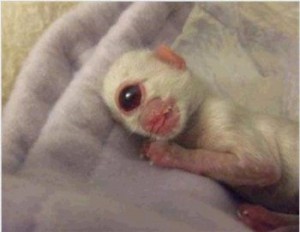 In rare cases, a bird will hatch from an unfertilized egg so the bird has only one set of chromosomes. Often the bird’s resistance to disease is so compromised that it can’t survive very long. In the rare cases it survives for a while, the effects of present mutations are readily apparent.
In rare cases, a bird will hatch from an unfertilized egg so the bird has only one set of chromosomes. Often the bird’s resistance to disease is so compromised that it can’t survive very long. In the rare cases it survives for a while, the effects of present mutations are readily apparent.
Does that look like the “engine of evolution” to you?
The Dichotomy of Argument
Extraordinarily, while Darwinists claim mutation can cause living things to scale Mount Improbable, Darwinists simultaneously recognize the problem of claiming “onward and upward” Neo-Darwinian evolution largely on the basis of mutation. They recognize this because mutations are known to be injurious thousands of times more often than they are advantageous.
For example, I’ve never heard of a Darwinist who believes that standing in front of an X-ray machine every day, or daily intake of industrial grade chemicals known to mutate spermatozoa, would eventually improve the human race. Furthermore, Darwinists infrequently argue that the destruction of the earth’s ozone layer would be beneficial because it would naturally increase mutation rates, and therefore, speed up human evolution.
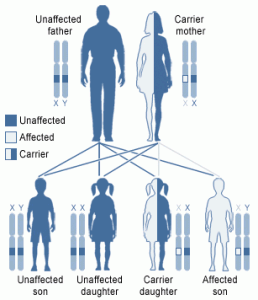 Darwinists, like everyone else, know that increasing mutation rates, will lead only to increased skin cancer, birth defects, organ failure, or other harmful changes. Perhaps a tiny drop of “UPWARD” change might occur, but it would be utterly lost in the ocean of downward, detrimental, or lethal changes.
Darwinists, like everyone else, know that increasing mutation rates, will lead only to increased skin cancer, birth defects, organ failure, or other harmful changes. Perhaps a tiny drop of “UPWARD” change might occur, but it would be utterly lost in the ocean of downward, detrimental, or lethal changes.
Why is it considered unwise (and illegal in most places) to marry someone who is too closely related to you by blood? As the early royal houses discovered, marrying cousins greatly increases the odds of bringing out really excellent trait combinations in progeny, after all.
The reason we don’t marry too closely by blood is because it is common knowledge that harmful mutations greatly outnumber any supposed helpful mutations. The genomes are so similar in close relatives that close intermarriage greatly increases the odds that bad genes are shared by each parent and will therefore manifest in their progeny.
This is a decidedly modern problem. It would not have been a problem as little as five thousand years ago, shortly after the initial act of God’s perfect creation. It would have been no problem for Cain and his wife or Seth and his wife, for example, all of whom must have been very closely related. Until mutations had a chance to accumulate in the genes of the human population and become part of the baggage of the Fall, no such risk of bad genetic combinations would have existed.
Good, Good, GOOD, Good Mutations! (To the tune of Good Vibrations)
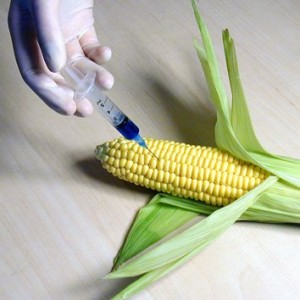 Nobel laureate George Beadle claimed that a “favorable” mutation might possibly be the one involved in the change from teosinte into corn. However, as he himself pointed out, this mutation favors human beings — not corn. Corn, Beadle said, is a “biological monstrosity” that could not survive on its own, not without man’s special care (artificial selection) in keeping it alive. Such care would include pesticides, herbicides, fertilizers, and careful environmental control and other horticultural processes not available to corn in nature.
Nobel laureate George Beadle claimed that a “favorable” mutation might possibly be the one involved in the change from teosinte into corn. However, as he himself pointed out, this mutation favors human beings — not corn. Corn, Beadle said, is a “biological monstrosity” that could not survive on its own, not without man’s special care (artificial selection) in keeping it alive. Such care would include pesticides, herbicides, fertilizers, and careful environmental control and other horticultural processes not available to corn in nature.
Actually, I can think of several examples of “favorable” mutations that lend a net “benefit” to human beings such as short-legged sheep, hairless dogs, and seedless grapes. None of these mutations benefit the organism’s individual fitness cost. All of these would be considered harmful to the organism in its own natural environment and, hence, not beneficial from the Darwinian evolutionary perspective. Therefore, all of these so-called “favorable” mutations must be excluded from the logical argument. After all, there is no evolutionary imperative or advantage to the grape for the grapes to lose its seeds so humans won’t hurt their teeth while eating the grape.
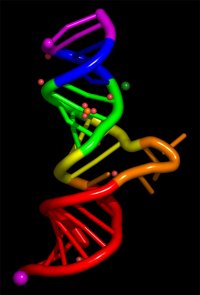 Even so, beneficial mutations are not impossible. E.g.: we observe that certain bacteria that lose the ability to metabolize certain sugars but can regain this ability via mutation. This observed mutation is admittedly beneficial. However, this observation still does not evidence Darwinian evolution. The bacterium isn’t advancing, or climbing some hypothetical evolutionary ladder, or becoming “more evolved” in some onward-and-upward Darwinian metaphor. At the end of the day, the bacteria mutates and goes exactly back to where it started. No new information has been added. Old and existing information, already endemic to this kind of bacteria, has merely been reacquired.
Even so, beneficial mutations are not impossible. E.g.: we observe that certain bacteria that lose the ability to metabolize certain sugars but can regain this ability via mutation. This observed mutation is admittedly beneficial. However, this observation still does not evidence Darwinian evolution. The bacterium isn’t advancing, or climbing some hypothetical evolutionary ladder, or becoming “more evolved” in some onward-and-upward Darwinian metaphor. At the end of the day, the bacteria mutates and goes exactly back to where it started. No new information has been added. Old and existing information, already endemic to this kind of bacteria, has merely been reacquired.
Historically, Darwinists have only ever offered one mutation, that of sickle-cell anemia, as the best example of a “beneficial” mutation within an organism. Sickle-cell anemia is a disorder of the red blood cells. People with full blown sickle-cell can look forward to a greatly shortened life span in addition to the promise of absolutely all consuming and thoroughly debilitating bouts of intense pain over the course of that preternaturally shortened life. Doesn’t that sound wonderfully beneficial?
Malaria is a disease caused by a parasite, a single-celled organism that gets inside red blood cells and metabolizes the hemoglobin in them, killing the cell. However, that particular parasite can’t metabolize sickle-cell hemoglobin. Carriers of one sickle-cell gene produce about half sickle-cell and half normal hemoglobin, and the Malaria parasite leaves the normal red blood cells alone in those thusly afflicted. So, carriers never contract malaria. Keep in mind that 25% of the children of sickle-cell mutation carriers will die of sickle-cell anemia, and another 25% of their children are still subject to contracting malaria, so we are talking about a specific pool of people.
The Darwinist argument is that in certain parts of Africa the death rate from malaria is quite high and carriers will never contract malaria.
Wow. Color me convinced.
Here is some additional information. In the parts of Africa in question, the death rates from anemia (while also quite high) are simply lower than the death rates from malaria. That isn’t a beneficial mutation argument, that is just natural selection at work among those populations. Natural selection mechanically accumulates genes that benefit short-term survival, even when it also reduces the long-term survival of the species at large.
When the frequency of the sickle-cell gene reaches 18% in a given population in affected areas, natural selection for sickle-cell plateaus. It’s at that point at which the death rates from sickle-cell anemia and malaria balance, demonstrating pretty decisively that sickle-cell anemia is not a useful model for the alleged perpetual “upward” genetic exploits Darwinists ascribe to mutation.
If you want to call sickle-cell a beneficial mutation, feel free. If you wanted to describe a real “beneficial” blood mutation, I would think that you would describe one that didn’t shorten the life span, didn’t make one often double over in excruciating pain for endless hours at a time, and perhaps improved the hemoglobin’s ability to carry oxygen, or inhibited lymphatic cancerous manifestations, or something like that.
All things considered, it’s an obscenely stupid argument. In certain parts of the world where I work, foot fungus is a very real problem. Terrible, highly contagious, itchy, burning foot fungus. Would any reasonable person argue that a mutation that leads to being born without feet — such that thusly afflicted souls never contracted these terrible foot fungi — was somehow to be considered a beneficial mutation? If that were the case, then literally any and every mutation must somehow be considered beneficial. And again, that runs counter to logic.
To reiterate, beneficial mutations are not hypothetically impossible. Obtaining sequential and simultaneous beneficial mutations approaches the boundaries of mathematical impossibility, but I covered that last week. Even so, the argument is not that they may not exist or may not be possible. The logical argument is that the cost is too high.
Hear about the broom salesman who sells 100 brooms a day for half the price he paid for them on wholesale? His hope is to make up his loses on volume. It simply doesn’t work. The juice isn’t worth the squeeze.
To explain the Neo-Darwinist model of evolution as the gradual selection (either natural or artificial) of beneficial mutations over time, one must also put up with the literally millions of harmful mutations that would have to occur along the way.
Due to our accumulated “genetic burden,” in modern human populations, serious hereditary defects average 5% of all human births. That percentage greatly increases among children of closely related parents, or those who are exposed to certain environmental factors such as toxins or radiation. Selection eliminates or reduces the worst phenotypic expression (visible) variety of mutations such as Downs, dwarfism, albinism, or mutations that greatly reduce life spans such as hemophilia, or Tay-Sach’s.
Francisco Ayala, an affirmed Darwinist long seen as one of the “old guard” defenders of the classic neo-Darwinian evolution model, confronted this fact. In an article Ayala penned in the Scientific American book Evolution, even Ayala confesses that, “for each beneficial mutant a species accumulated, the price would be a thousand or more harmful mutations. When the genetic burden gets too great, offspring are so likely to have serious hereditary defects that the ability of the species to survive is threatened.”
The Truth
The truth is that logic and observed, operational science show that the genetic structure of living things is in a state of winding down just as the General Second Law of Thermodynamics predicts. Genetic code, which was once created in a state of perfect order, is tending toward a state of disorder.
Mutation does not add order. Mutation does not, and cannot, add information to the genome. Mutation is, in fact, one of the main engines of infusing entropy — disorder — into the ordered system that is DNA.
The truth is that God’s holy word, the revealed knowledge found in the Bible, provides a concise and scientific explanation for both the origin of life and life’s current state of corruption.
I commit to you that I will publish every single comment that meets this blog’s commenting criteria. You may want to review that criteria before adding your opinion here.
God Bless you and yours.
Gregg
Resources:
Additional Posts dealing with Creation and Darwinism


….Darwinism claims that all life began, at the very first, as non-life (dirt and rocks and such) that one day decided to form itself into a “simple” single-celled organism. Darwinism provides no reasonable basis for the decision on the part of the non-living material,…”
.
Evolutionary biology does not include the idea that there was ever a DECISION made.
.
… through chance, and purely random changes via only two mechanisms,”
Yes, by chance not decision, But not only two processes – geentic drift in the population is another example.
.
…Mutation must be shown to be demonstrably and substantively able to infuse NEW and/or ADDITIONAL information into the genes of living things. Moreover, mutation must not be shown to substantively act as a reductive mechanism in living things.”
.
For evolution to occur mutations do add new variations on genetic information. But this does not mean that other mutations can not also have detrimental effects. Maybe you’re talking about a balance – the mutation rate can’t be so high that the existing genetic information becomes so mangled that the species fails to live and reproduce successfully . I think there are some examples (can’t remember if it’s plants or bacteria) where environmental stress increases the mutation rate.
.
….Natural selection occurs. Darwinists who claim that Christians deny the very existence of selection are simply arguing with a straw man.”
I don’t remember which post, but I know you have made inaccurate comments about natural selection; my memory is that you implied there needed to be some phenomenon making the selection deliberately.
.
…The bacterium isn’t advancing, or climbing some hypothetical evolutionary ladder, or becoming “more evolved” in some onward-and-upward Darwinian metaphor.”
This post is full of false representations of evolutionary biology, and ones I have pointed out before.
.
Too much to respond to in this post right now.
…”Consider this: nearly every mutation we know about is identified by either the disease, debilitating condition, or grosser abnormality in which it results in living things.”
.
Maybe that’s true for the mutations YOU know about. If a mutation is such that it makes an observable change in the phenotype, especially one that causes a disease, then it is investigated and given a name. But in your other post you yourself mentioned the new information that says that each of is on average has about 100 mutations. They would be known through sequencing. Many are listed as specific SNPs. There are thousands and thousands of these mutations. For the most part they cause no apparent phenotypic effects.
….”Even so, beneficial mutations are not impossible. E.g.: we observe that certain bacteria that lose the ability to metabolize certain sugars but can regain this ability via mutation. This observed mutation is admittedly beneficial. However, this observation still does not evidence Darwinian evolution. The bacterium isn’t advancing, or climbing some hypothetical evolutionary ladder, or becoming “more evolved” in some onward-and-upward Darwinian metaphor. At the end of the day, the bacteria mutates and goes exactly back to where it started. No new information has been added. Old and existing information, already endemic to this kind of bacteria, has merely been reacquired.”
.
.
I’m glad you do think that beneficial mutations are possible.
.
Are you talking about Lenski’s experiments here? I looked at a couple of his papers online. For his bacteria that evolved to use citrate he considered at one point that the change was an ability to transport citrate under oxic conditions, which he said was something not known in E. Coli. He suggested as possibilities that either a citrate transporter that worked under anoxic conditions had mutated to be able to transport citrate in oxic conditions or that some other transporter that could transport in oxic conditions had changed to be able to transport citrate. (I can’t give you details on this but you can read the papers yourself.. Also I didn’t read all his papers and I don’t know if he eventually figured out exactly what the mutations were.)
.
If Lenski is correct in one of his hypotheses, then the mutation did not apparently reverse the E. Coli to a previous condition but created a variation in a protein transporter molecule. This is new information for that type of bacteria. This might seem to you a small change but this is the level at which to expect changes in bacteria.
Darwinian evolution is exactly about changes in genetic sequence which result in changes in expression of proteins.
You say it is not an example of Darwinian evolution because the bacteria doesn’t climb some hypothetical ladder. This ladder-climbing idea is a straw man that you are imposing on evolutionary biology and not an actual feature of biological thinking . What happened was that in that particular environment (the nutritional medium and conditions in which the bacteria were grown), that mutation or set of mutations enabled those bacteria to reproduce to a larger population size than the ones without the mutation.
.
.
.
here are three Lenski papers; I think they are all public access. There are others listed on pubmed and I might have missed the most useful. But he does discuss some of the very things you talked about in this essay.
http://myxo.css.msu.edu/lenski/pdf/2008,%20PNAS,%20Blount%20et%20al.pdf
http://www.ncbi.nlm.nih.gov/pmc/articles/PMC2806358/?tool=pubmed
http://www.ncbi.nlm.nih.gov/pmc/articles/PMC2890043/?tool=pubmed
You said this above:
…”Natural selection occurs. Darwinists who claim that Christians deny the very existence of selection are simply arguing with a straw man. ”
.
I can’t find the comment I was thinking of, but my memory was correct; you did say what sounds like the opposite of that statement in your essay: “Creation: Mother Nature’s Plan”:
.
“The reason that scientifically authoritative phrase, “natural selection,” sounds so able to get the job done is because it has that little word, “selection,” in there. Although very clever sounding, it makes “natural selection” a built-in lie. The truth is that nothing mindless has the ability to select because nothing without a mind can think.
The further truth is that, “natural selection” does not even actually exist.”
.
I know there was a comment where I argued with you on this and used the example of a colder than usual winter as a mindless natural selection factor. I don’t know which post that.
My point was that we might be better served calling it natural reduction or natural elimination because it doesn’t select. Selecting requires the ability to discriminate and choose.
….”To explain the Neo-Darwinist model of evolution as the gradual selection (either natural or artificial) of beneficial mutations over time, one must also put up with the literally millions of harmful mutations that would have to occur along the way.”
.
But the most harmful mutations are removed immediately because the are incompatible with life, or slightly later if they are incompatible with reproduction. Obviously we do, as you described, put up with some percent of recessive mutations which are harmful, and also a percent of alleles which are slightly or somewhat negative compared to other alleles.
The phrase ‘natural selection’ has a long-standing meaning which does not include conscious choice. You may think it was not the best phrase to use, but I hope you agree that the phrase as used in biology does have a clear and agreed-on meaning which is different from the way a human would consciously select.
You could use a sieve to select larger rocks from smaller rocks; I think it’s fair to use the word ‘select’or ‘discriminate’ in that context although there’s nothing conscious going on in that process. You may disagree about the word use there.
Natural selection does not have to imply elimination, as in death. It can mean a different reproductive success.
(I keep thinking of things to post.)
.
I think we’re getting close to better information on the mutations to answer your objections. Maybe that sounds like an excuse, but I think it’s reasonable: we are acquiring genomic information at an amazing pace. And we are acquiring increasing info about development. I think it would make this kind of discussion so much easier once we know some of the actual genomic differences that result in the structural difference between, for example, canids and felids, dogs and bears, rabbits and rodents.
It’s pretty obvious by looking at a bunny that it is structurally different in the hind legs from a rat or woodchuck or guinea pig etc. But what actual genetic difference or set of differences results in that anatomical difference? Is it many or few? It looks like there’s a big difference between a rabbit and a rodent, but maybe in terms of genetic changes it is not a complicated change.
You said this:
…”Key is this: the types of mutations that Darwinists claim can infuse desirable traits into living things have never actually been observed to take place. ”
.
.
Many different types of mutations have been observed. What actual type of mutation are you talking about here?
.
.